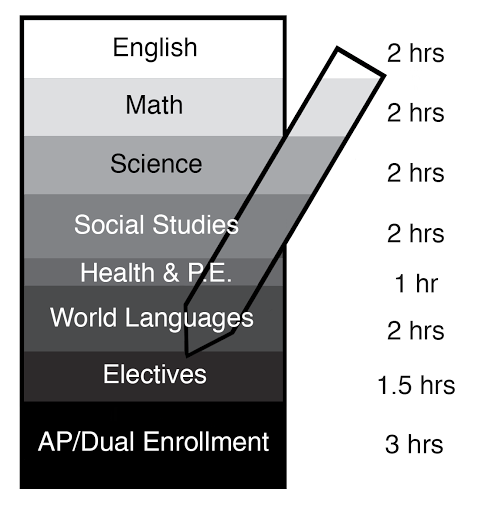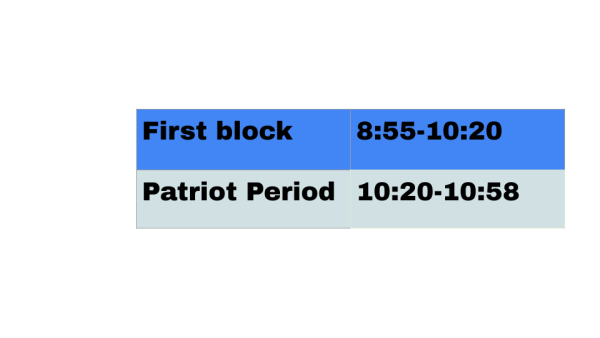Less homework?
New County policy proposes time limits on how much teachers assign students

This chart details how much homework would be allowed per subject with the new homework policy.
May 23, 2016
Homework– teachers give it, students dread it. However, students may be seeing a little less of it next school year.
School system officials are preparing a new policy for homework beginning in the 2016-2017 school year, focusing on placing quality over quantity..
According to the draft policy, elementary schoolers should not be assigned more than 50 minutes of homework each week, and middle schoolers should not have more than 80 minutes. High schoolers should not be assigned more than 2 hours of homework per week for each core class. AP and Dual Enrollment classes would be able to exceed this limit and assign up to 3 hours of homework a week.
The 3 hour limit is based on the optimized amount of time for students to spend on homework (highest AP scores vs. time spent on homework), which occurs at 188 minutes, according to the presentation the Homework Policy Committee gave to the School Board at their May 12 meeting.
The presentation also stated that currently 95 percent of County teachers fall within these guidelines already and 85 percent of AP and Dual Enrollment teachers are within the 3 hour time limit.
AP Language and Composition teacher Sheri Haas supports the new policy and said that she assigns her students between 30 and 45 minutes of homework each night between classes, which would fall within the proposed limits.
However, some teachers feel that the time limits are too subjective.
“What takes you three hours might take someone else six hours,” AP and Dual Enrollment US History Teacher Ted Thill said. “Somebody’s three hours might take you an hour.”
“It’s [the homework policy] a subjective standard that doesn’t fit for all students; you have to encourage them to be as efficient with their time as possible,” Thill continued.
This begs the question on everyone’s mind: will they still have to outline?
“Yes, in the AP and Dual classes they will be essentially doing the same work,” Thill said.
He believes that, “any history course that’s going to be including mastery of content” includes effective and necessary outlining and discussions.
Sophomore Nick Ashby believes that AP and Dual Enrollment courses should not be subject to the homework policy at all.
“The students in these classes are given a larger amount of work because they are being taught at a college level,” Ashby said during the public comment section of the May 12 School Board meeting.
“By enrolling in one of these classes, students waive the right to come under this policy and should all understand that,” Ashby continued. “They are not high school students in this respect, and the County should not be able to put a cap on the amount of homework given in a class run by the College Board or PVCC. They are the providers, therefore they get to set the rules.”
Junior Daniel Perez, who is taking AP US History, said that it takes him about two hours to outline one chapter and that usually he is assigned two outlines a week. This would put his history homework at about four hours a week, an hour above the proposed policy’s limit.
The policy does say that, “Parents and students should expect that some of the assignments in these courses will exceed the time limitations designated for high school credit classes.” Some worry that this will allow teachers to continually give more than 3 hours of homework.
“The language in the guidelines is definitely not supposed to be a green light for teachers to systematically ignore them,” School Board Chair Kate Acuff said via e-mail. “If a teacher is routinely assigning homework in excess of the guidelines, parents should contact the school principal who will then discuss it with the teacher.”
The committee acknowledged that one problem was a disconnect between how long a teacher believes an assignment should take and how long the student actually spends engaged in the task.
As part of the policy, the committee classified four different types of homework. The first type of designated homework is Completion Work, in which work that is not finished in class is to be finished for homework. The second type is Practice Work, which, as the name suggests, practices the skills that students have learned that day in class. The third type of homework is Preparation Work, which prepares students for what they will be learning the next class. The final type of homework is Extension Work, which is “Any work that explores and refines learning in new contexts or integrates and expands on classroom learning,” according to the draft policy.
By classifying different types of homework, the Homework Policy Committee wanted to encourage teachers to think more about what types of assignments they give.
Homework Policy Committee member Jeff Prillaman said that he hopes that focussing on the time turns into a focus on the quality. If teachers have to shrink the amount of time that can be spent on homework, then perhaps they will re-think what they assign and make it more meaningful.
“More homework is not the answer. Better homework is,” Acuff said.
The School Board will vote on whether to approve the policy on May 26.
UPDATE: The Albemarle County School Board voted unaniously to enact the new homework policy on Thursday, May 26.










